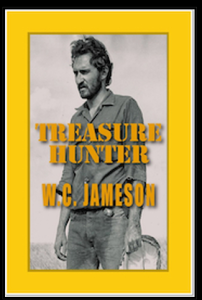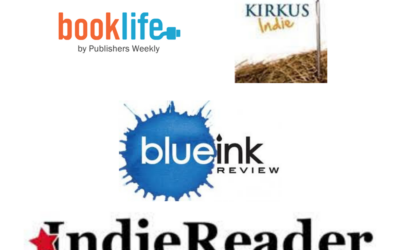After publishing 70 titles, North America’s premier treasure hunter, WC Jameson, just released his adventure memoir, Treasure Hunter: Caches, Curses, and Deadly Confrontations Seven Oaks Publishing, 10/3/11) paperback & ebook, 206 pages, 9780963082978.
Treasure Hunter is one intrepid man’s efforts to find the lost treasures of North America. Jameson and his partners piece together centuries-old histories through documents, maps, and stories passed down from one generation to the next, facing life-threatening danger time and again. These riveting stories, told with humor and candor, are a portal to another time, and are a testament to the spirited independence of risk-takers, a few of whom still exist in what we think of as the modern age.
Chapter One Excerpt
“Guadalupe Mountain Gold”
from
Treasure Hunter: Caches, Curses, and Deadly Confrontations
There comes a time in every rightly constructed boy’s life when he has a raging desire to go somewhere and dig for hidden treasure. – Anon.
It was an hour past sundown, and a three-quarter moon hung low in the sky providing enough light for me to see my surroundings and make my way through the willows and into the fenced yard. Anyone surveying the grounds would be able to spot me in the moonlight, but I decided it was worth the risk.
A three-foot high picket fence surrounded the yard. Lying just on the other side was my target – a twelve-by-four-foot patch of strawberries that had come to perfect ripeness that afternoon, the bright red fruits reflecting the moon’s silver glow. It was 1953 and I was eleven years old. I had been thinking about those strawberries for a week, and now I was going after them. Gene Seitsinger had a reputation for growing the finest berries in West Texas.
I had thought about asking Seitsinger if I could pick some of the fruit, but knew
I would be denied. He was known by all as mean, angry, and particularly hostile
to youngsters. There were stories that circulated around the lower valley where
we lived that the last time Seitsinger found a boy in his strawberry patch, he
tied him to a tree and whipped him with a belt. There were other stories,
supposedly true accounts, of boys who told their friends they were going to
steal berries from Seitsinger’s patch and were never seen again. As far as I
knew, no one ever verified the accuracy of these stories, but it gave me pause.
It also provided the temptation of a challenge.
The pickets were held to the bracing by small, thin nails. I pulled at the bottom
of one and it gave easily, but the squeaking of the rusted and resistant nail
broke the silence of the evening. I hoped the chirping of summer crickets and
the peeping of frogs covered the sound. Moving aside the picket, I wriggled
through. Crawling on my belly in the cool grass, I crossed the thirty-five feet
to the patch, which lay only spitting distance from Seitsinger’s back porch.
Barefooted and summer-tanned, I wore a pair of threadbare Levis because it was
all I owned, and a green t-shirt because I thought it would help camouflage me
against the plants. If Seitsinger or his wife, Ruby Lee, were to come outside
and glance into their garden, they would spot me with no difficulty.
After squirming into the plot and wedging myself between rows of plants, I turned
onto my back, reached out, and plucked a juicy fruit from a nearby cluster. I
brought it to my face, regarded the beautiful red color reflected in the lunar
light and felt the firmness between my fingers. It was a large berry, one of
the biggest I had ever seen. I inhaled the aroma. In those days, I thought
nothing smelled as delicious, as sensual, as a fresh, ripe strawberry. I took a
bite, savored the flavor for a full minute, took another, and then swallowed
the remainder.
For fifteen minutes I plucked the fruits and ate, one slow berry at a time, careful
to harvest them from several different plants in the hope that the pillage
would go unnoticed the next day. I planned on returning every night until such
time as the Seitsingers picked the crop. I extended my right arm beyond my head
as far as I could reach and felt for berries among the leaves and stems.
Finally, I found another large one, perhaps the biggest of the evening. As I
was about to pull it from the plant, the back porch light came on and four men
walked outside. I froze, arm still extended, moonlight shining on me less than
ten feet from the porch.
I turned toward the sounds and saw Seitsinger accompanied by Hobie Schwarz, Tex
Sanderson, and Simon McVay, neighbors, more or less, each living within a mile
or two of the others. The men were holding drinks, bourbon I guessed from the
color. They sat down around a wooden table. I tried to make myself smaller, to
melt into the ground. I dared not move. For a few minutes, the men talked about
the delicious meal they had just finished. Ruby Lee had fed them steaks, baked
potato, grilled vegetables, and apple pie. Seitsinger then unrolled a large
piece of brownish paper that appeared to be a map. The four men stared intently
and then began speaking.
“The old man who used to own this told me the treasure is hidden in a small cave to
the east of this arroyo,” said Sanderson, jabbing at the map with a
finger. “This spring over here keeps the arroyo running with an inch-deep flow of water most of the year. The cave is
supposed to be southeast of the spring, somewhere about here.”
“How did that old man know about this treasure?” asked McVay. “And where did he get the map?”
“He told me he stole the gold himself and hid it there more than fifty years ago.
He drew the map, planning on returning at a later date and retrieving it, but
he never got the chance. Between battling consumption and having to care for
his crippled-up wife, he never could leave Bisbee, Arizona, long enough to go
get it.”
“How come he told you about it?” asked Seitsinger.
“I saved his son’s life in the Korean war. He was badly wounded in the leg from a
grenade explosion, couldn’t walk, and was bleeding like a stuck hog. Our
company was retreating from a hill we failed to take, so I picked him up and
carried him a mile or more from the field of fire. His leg was mangled pretty
bad. I cleaned out his wounds, bandaged him up, and got him to a field
hospital. They sent him home a month later. They told him if I hadn’t pulled
him out and stopped the bleeding he would have died in an hour.”
I heard grunts of acknowledgement from the other men.
“Last year I stopped by to visit him and his family in Bisbee,” said Sanderson. “His
old man took me aside to thank me for all I done, and then told me about his
outlaw past, about the treasure, and hiding it in the Guadalupe Mountains.”
“What about the son?” asked Schwarz. “Isn’t he entitled to some of this, if it’s there?”
“The son doesn’t know a thing about his father once living on the other side of the
law and he doesn’t know a thing about the treasure,” said Sanderson. “The old
man refers to the gold as ill-gotten gains and doesn’t want the boy to have
anything to do with it.”
Pointing at the map, Schwarz asked, “What about this location? Can we just waltz in
there and get this stuff or is it private property. What if we get caught?”
“It’s part of the J.C. Hunter Ranch,” offered McVay. “Hunter owns most of the front
of the Guadalupe Mountains and a lot of the top. I know Hunter a little.
Mostly, I know his foreman, a man named Noel Kincaid. I worked for him a couple
of times stringing fence and branding cattle. We could stop by the ranch house
where Kincaid lives and just tell him we’re out hunting for arrowheads. He
won’t mind. People do it all the time out there, and he’s real easy to get
along with.”
“Assuming we find the gold, it’ll take a while to carry one hundred ingots from the cave
to my car,” said Sanderson. “It looks like the closest we can park is about a
mile-and-a-half away, and them bars are gonna be heavy, maybe twenty to thirty
pounds apiece. We’re looking at a lot of trips back and forth.”
“Who cares?” said Seitsinger. “If this pans out, we’ll all be pretty damn rich.
Seems to me like it’s worth the effort.”
McVay rose, said he needed another drink, and went into the house. Seitsinger
stretched, made some comment about the dinner, and then asked if anyone was in
the mood for strawberries. He rose from his chair and walked out to the edge of
the porch, hands on the railing, and looked down into the patch.
He stood thus for a full minute, then turned to Sanderson and said, “Tex, are you
packing that boot pistol?”
In response, Sanderson reached down into his right cowboy boot and withdrew a
custom .22 revolver and held it up.
“Toss it here.”
Seitsinger caught the weapon in his right hand by the grip, swung around, and pointed it at me.
“Tex,” he said. “It seems like we got a prowler.” He clicked back the hammer.
At this moment, McVay walked back outside, a fresh bourbon in his hand. I could
hear the ice clinking in the glass. He joined Seitsinger and stared at me lying
on the ground. McVay, who had the vision of an owl in the dark, said, “That’s
the Jameson kid. He ain’t no prowler. He’s probably just filchin’
strawberries.”
“Stand up!” commanded Seitsinger.
I rose, heart hammering against my ribs.
“Get on up here,” he said, gesturing at the porch. “And if you step on a single one
of those berry plants, I’m gonna shoot you.”
With extreme caution, I made my way across the rows and stepped up onto the wooden
porch, my skinny arms raised above my head like I had seen men do in movies
when held at gunpoint. Seitsinger grabbed my shoulder and pushed me toward the
table. The pistol never swayed from my direction.
“Leave him be,” said McVay, stepping between me and the gun. “I know this boy. He
lives with his mom and brother and sister in the rock house on the other side
of the big alfalfa field to the west. His dad ain’t never around and they got
no money. He was probably hungry.”
“We got a problem, Simon,” said Sietsinger. “This kid heard everything we said. We
can’t turn him loose to tell everybody what we’re all about. Hell, we have
enough trouble keeping things quiet as it is and we sure as hell don’t need
some kid blabbing about it.”
“We don’t have a problem,” said McVay. “I’ve known this boy a long time and he’s a
good one. “
“What if he talks?”
“He won’t talk if he’s one of us. I say let’s take him with us on the hunt, show
him what we do, maybe give him a part of the action. At the very least, he
might make a decent camp hand.”
“I’m for it,” said Sanderson.
Schwarz nodded agreement. Within seconds of being caught stealing strawberries and
believing I was going to be shot and killed, I became a member of a clandestine
team of treasure hunters. It was to change my life forever.
Two weeks later, I was sitting in the front seat of Sanderson’s 1949 Chrysler sedan
between him and Seitsinger. Schwarz and McVay rode in the back. On arriving at
the Hunter Ranch, McVay got out and walked over to speak with Hunter Ranch
foreman Noel Kincaid by some cattle pens. The trip to the Guadalupe Mountains
in Culberson County, Texas, had taken about three hours from the time they
picked me up at my house. It was my first time to travel eastward on Highway
62-180 and I thrilled at the journey through the Hueco Mountains and across the
gravel and sand desert and salt flats to the foothills of the magnificent
range.
After several minutes, McVay returned to the truck, squeezed in, and told us Kincaid
said it was okay to camp over by Manzanita Spring. “That’s about as close as we’ll
get the car to the search location anyway,” said McVay.
We set up camp next to the pool of fresh spring water. Sanderson said we might be
there for four or five days, depending on what we found, if anything, and how
long it took to move the gold from the cave to the Chrysler. That evening,
McVay prepared dinner, a delicious stew of beef, tomatoes, red chiles, onions,
celery, garlic, and green beans, served with warmed corn tortillas and coffee.
After dinner while the men sipped whiskey, I cleaned the dishes and put them
away.
The next morning following a breakfast of scrambled eggs, sausage, flour tortillas,
a delicious cheese they called asadero, and coffee, we hiked across the foothills and negotiated some deep arroyos,
finally arriving at Juniper Spring. There, a trickle of water spilled from the
brush-choked opening. Twenty yards down the shallow arroyo the flow disappeared
underground into the permeable rock and sand. Referring often to the map,
Sanderson parceled out areas along the slope for each man to search. Flattered
to be included, I alternately felt important and nervous. I didn’t want to
screw up. I still wasn’t convinced that Seitsinger would not kill me.
We found dozens of caves; some were only large enough to allow entrance for a
porcupine or badger. Others, though narrow and low ceilinged, could almost
accommodate four or five men at a time. The deepest we encountered extended
about twenty-five feet into the huge, bare expanse of limestone. We hacked away
at the thick low brush covering some entrances, and rolled away stones from
others.
Rattlesnakes taking shade inside the cooler confines of the caves were a constant hazard.
Using a stick, Sanderson flipped a rattler from the mouth of one cave and
across several yards of hillside. It missed me by only a few inches, causing an
adrenaline rush like I’d never experienced before, the first of many I would be
exposed to. When the snake landed near my feet, I studied it, fascinated. Alive
with some new and strange atavistic connection, I reached to pick it up when I
heard a shout from Schwarz. He found the cave.
Fifteen yards away, bent over and hands on knees, Schwartz peered into a small opening.
“I’ve got something,” he called out. “Come take a look at this.”
The rest of us clustered around the low, dark entrance. Schwarz dropped to his
knees and started to crawl inside when a sharp buzzing caused him to scamper
backwards. Two feet inside the opening, a four-foot long diamondback
rattlesnake lay coiled, tongue darting in and out.
Using a length of juniper branch lying nearby, McVay dragged the serpent out into the
sunlight and tossed it down the slope. He beat around the inside for a few
seconds with the branch to make certain there were no more snakes. He backed
out and told Schwarz, “You found it. You go first.”
Schwarz crawled in, followed by Seitsinger, Sanderson, and McVay. Before he entered,
Simon turned to me and said, “You stay out here.”
At first I was hurt, disappointed, but then realized I was just a kid and they had
their reasons. From inside the cave I could hear murmured conversation and the
dull clank of heavy metal objects. Ten minutes later, McVay crawled out and
took a seated position at the entrance. He pointed to a spot two feet away and
told me to stand there. Leaning back into the cave he called, “I’m ready!”
A moment later, someone inside handed him an ingot that he, in turn, passed to me
with instructions to start a pile like I was stacking firewood. The dust
covered bar was surprisingly heavy for being no bigger than it was. I stood
transfixed by the dull yellow color and the texture. It was the first time I
had ever held and hefted such a thing. Again, I felt a rush. I had only seen
gold on jewelry worn by people outside my family. As I stared at the ingot,
McVay smiled and told me it was probably worth over $10,000.
After ten bars had been passed from the cave and stacked, the men crawled out.
Sanderson, Seitsinger, Schwartz, and McVay stood outside the entrance brushing
fine dust and packrat nest debris from their clothes.
“Now comes the hard part,” said Sanderson, “and that’s carrying these heavy bastards
down to the truck. We should have brought some packs.”
Each man picked up two ingots and without a word started down the rocky slope toward
the campsite. I tried to lift the last two but couldn’t manage. I only weighed
ninety pounds and together the two bars were more than half my weight. I yelled
to Seitsinger that I couldn’t carry them both. Without pausing, he said, “Carry
one down, then come back and get the other.” Mortified, I picked up one of the
ingots and followed.
During the next two days, all of the bars were removed from the cave and carried to
camp. Fifty of them were loaded into the trunk of the Chrysler and covered with
a tarp. The back end of the car sagged and I thought the tires would burst. We
carried the rest to the middle of an abandoned orchard about two hundred yards
away and buried them. The fruit trees were located several yards to the east of
Kincaid’s house. I overheard Seitsinger tell Schwarz that when the ingots in
the trunk had been sold, they would come back and retrieve the rest.
We returned to El Paso about an hour before sundown and I was dropped off in front
of my house with a caution: Never tell anyone about the gold. If I did,
Seitsinger said he would deal with me personally. McVay explained that a closed
mouth is the first requirement of a professional treasure hunter.
That night, I dreamt of gold, wealth, and adventure. I continue to have the dreams
to this day
Postscript:
I was never paid anything for my role in retrieving the gold ingots from the
cave and serving as a camp hand. I mentioned this to McVay a few years
afterward and he laughed, saying that Seitsinger believed it was payment enough
that he did not kill me for stealing his strawberries.
It had never bothered me that I didn’t get a cut of what had been realized from
the sale of the gold. I had grown up in a household with little money and had
no experience with cash. I had become wealthy, however, as a result of the
experience with the four treasure hunters. The event inspired and affected me
in a number of ways that determined the course of my life.
I remained in touch with Simon McVay for the next three decades. When I was
forty-five years old I visited him at his house in Ysleta, Texas. As it turned
out, it was only a few weeks before he passed away. We talked about the time I
had accompanied him and his three friends to the Guadalupe Mountains more than
thirty years earlier. He asked me if I was still upset about not being given a
share of the treasure we hauled out of the cave. I told him I wasn’t. He then
asked me if I would like to be included now. I invited him to explain him what
he meant, and he provided a fascinating piece of information.
Taking a sip of bourbon, Simon asked me if I remembered the fifty ingots we had
carried to the old abandoned orchard and buried with the intent of retrieving
at some later date. I said I did.
With a wink and a smile, he said, “They are still there.”







Treasure Hunter is from the Lost Mines and Buried Treasures Series. I’m an email subscriber.
I love this book! Yes, I’m a biased reader since I encouraged my husband to write this book and I was his first reader and editor, but I still think these are some of the most exciting stories I’ve ever read. Good luck to all who participate in the free book give-a-way.
Hi, Stephanie,
Thanks for having such an interesting guest! I can’t imagine a more interesting life than being a treasure hunter.
Treasure Hunter is a great find in the Lost MInes and Buried Treasures Series. I would love to strike it rich with a free copy of the paperback edition.
Truly an interesting person and life, but also so talented at writing. What a voice!
from the Lost Mines and Buried Treasures series
Wow, what a life! This sounds awesome!
It’s from the Lost Mines and Buried Treasures Series!